ONLINE - LIFE DURING THE PANDEMIC
In times of social distancing life has shifted from the physical world to online platforms. Video calls and social networks have become essential tools to preserve human connections, yet profoundly changed communication. Activities for which real-life encounters were considered indispensable, have found their way to the virtual realm in an attempt to keep alive routines and social occasions. Living rooms turn into sports halls, religion is practiced via computer and parties without crowds find partakers from home. Can a format that emerged as a coping mechanism for lockdowns during Coronavirus endure in a post-social distancing era? In what way can it replace real-life experiences? How does it reshape relationships, work environments and social norms?
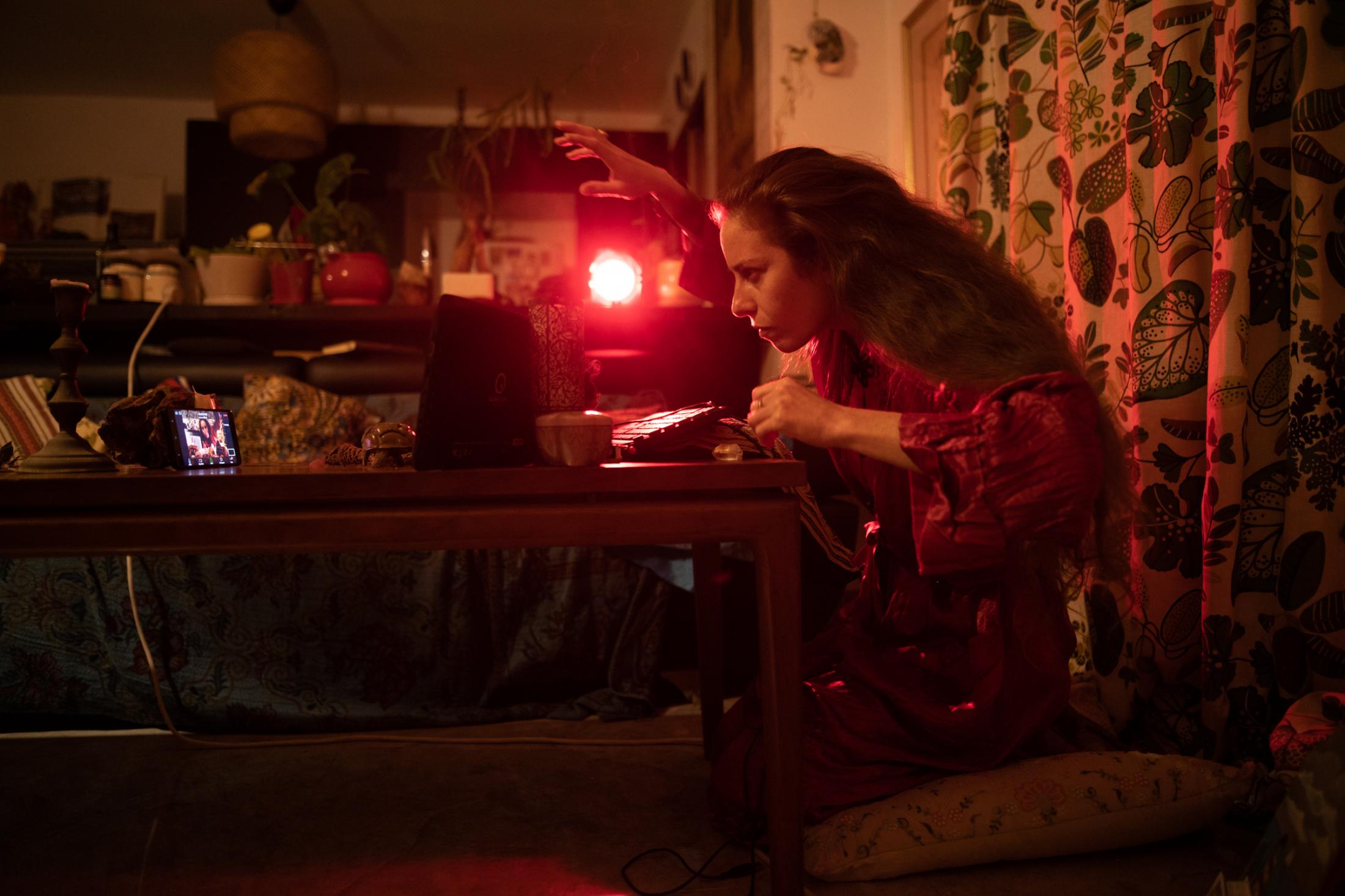
2 / 17
Actress of Mystorin Theatere, Dana Forer, 41, performs in front of her phone during a live show on Zoom in her home in Tel Aviv, Israel, April 12, 2020.
“One of the things that made me be in this profession is the eye contact and the direct feedback I get from the audience. Now I’m doing the action but without reaction. The audience watches me, but I don’t see them. I act towards my partners, but I’m just looking at myself. On the one hand it feels lonely, but on the other hand it feels very intimate and exposed. I would never have thought that I would get into a situation that I let almost 100 people ‘into my house’.”
“One of the things that made me be in this profession is the eye contact and the direct feedback I get from the audience. Now I’m doing the action but without reaction. The audience watches me, but I don’t see them. I act towards my partners, but I’m just looking at myself. On the one hand it feels lonely, but on the other hand it feels very intimate and exposed. I would never have thought that I would get into a situation that I let almost 100 people ‘into my house’.”
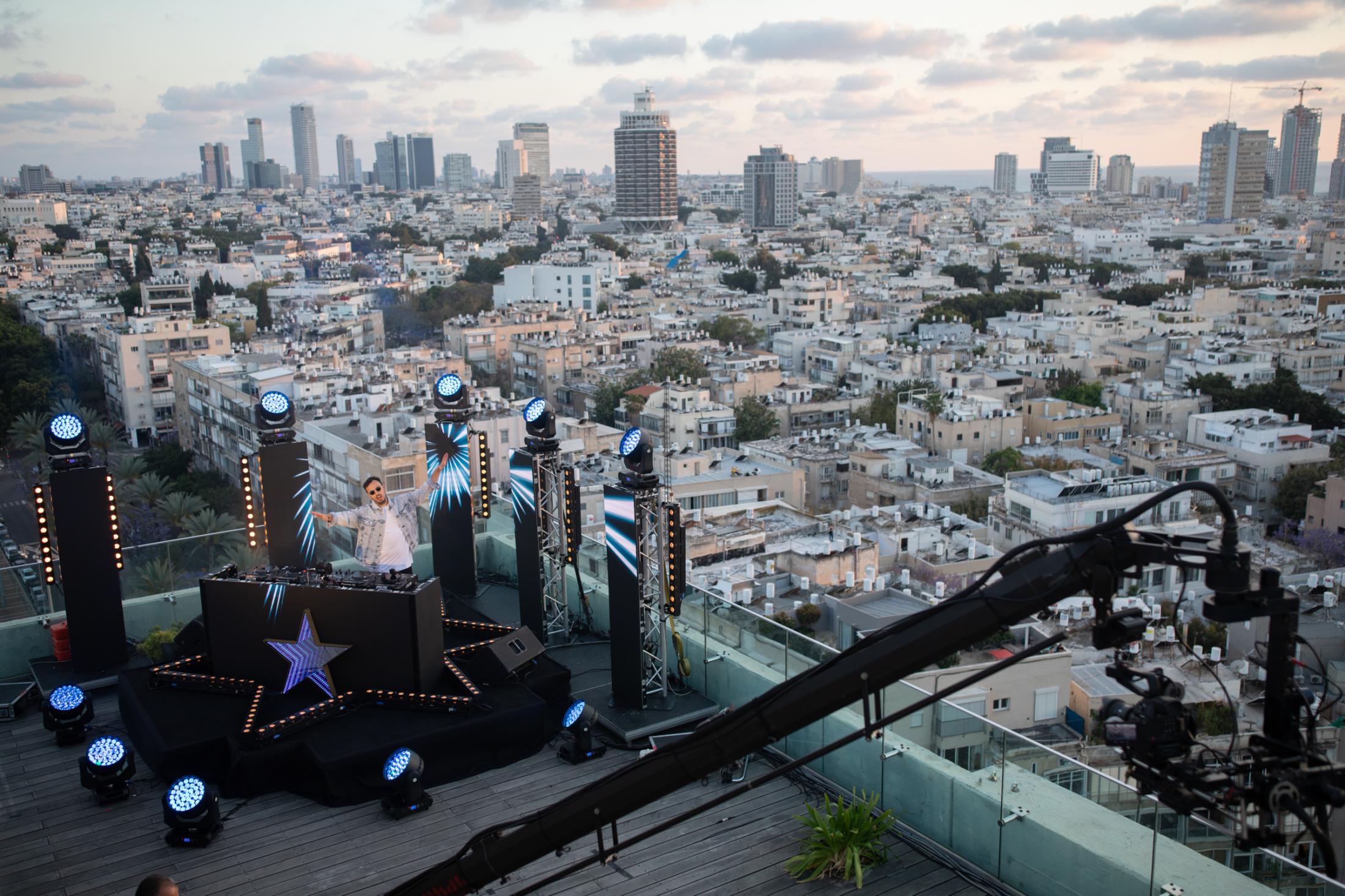
3 / 17
DJ Itay Galo, 33, performs during an online party that is broadcasted live via Zoom and Facebook Live, from the roof of the Tel Aviv municipality building, Tel Aviv, Israel, April 29, 2020.
“It’s like a fake, it’s not the real thing, but everybody tags me on Facebook and Instagram, they watch me and I like it. It’s good for this situation, but after the Corona I want to see the crowd.”
“It’s like a fake, it’s not the real thing, but everybody tags me on Facebook and Instagram, they watch me and I like it. It’s good for this situation, but after the Corona I want to see the crowd.”
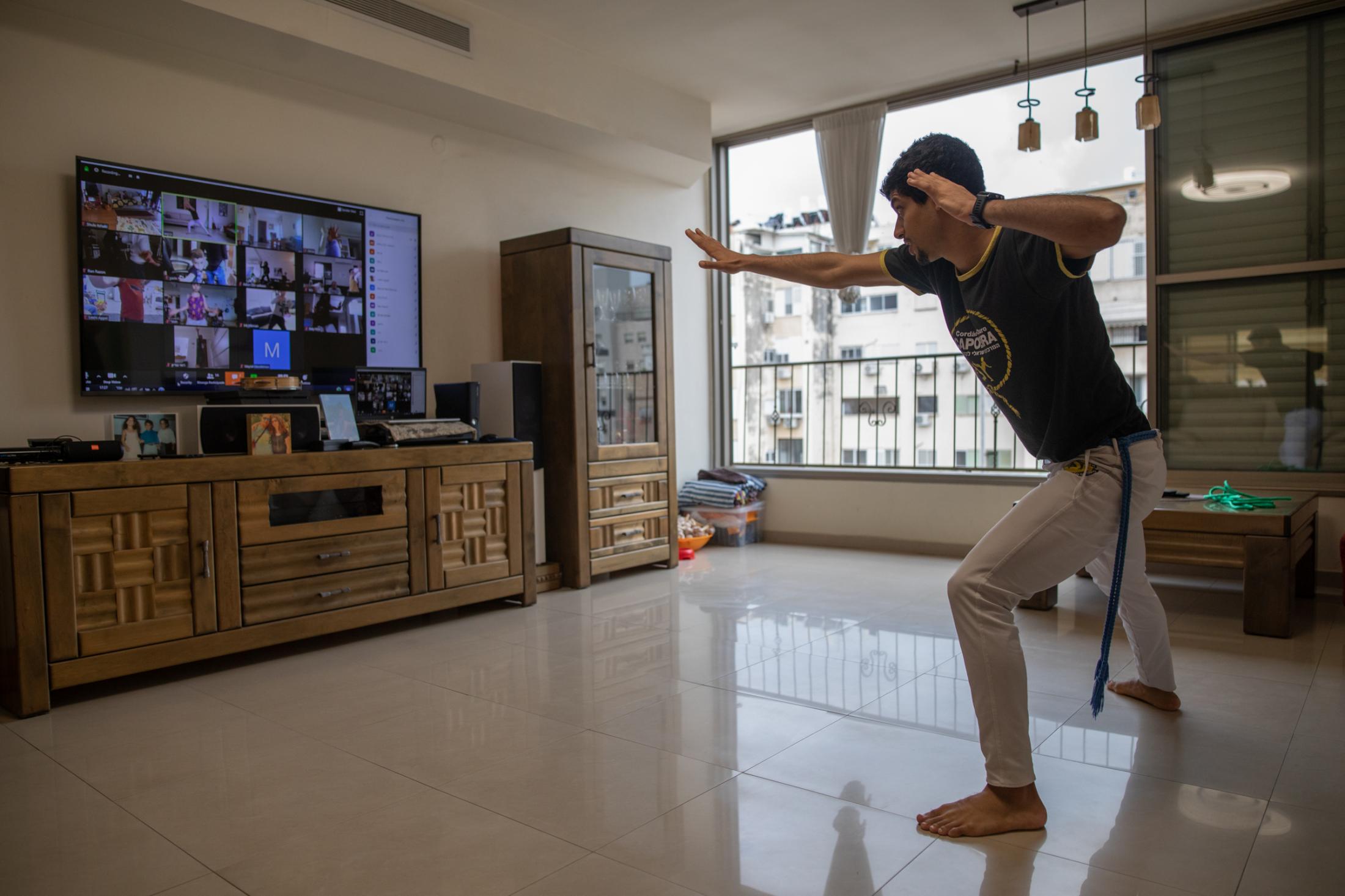
4 / 17
Capoeira instructor Gal Maabari, 25, gives an online Capoeira lesson for children on Zoom in his home in Tel Aviv, Israel, April 16, 2020.
“For me it’s a positive experience. Giving an online course makes me think about the ‘Why’, about the purpose of why I’m doing it. It’s like resetting the whole concept of work, of everything. It makes me creative because now I need to think about the interaction with the students. Everything I do in the physical class, like giving feedback or demonstrating something, I do automatically; everything I do in the online classes, I understand better now.”
“For me it’s a positive experience. Giving an online course makes me think about the ‘Why’, about the purpose of why I’m doing it. It’s like resetting the whole concept of work, of everything. It makes me creative because now I need to think about the interaction with the students. Everything I do in the physical class, like giving feedback or demonstrating something, I do automatically; everything I do in the online classes, I understand better now.”
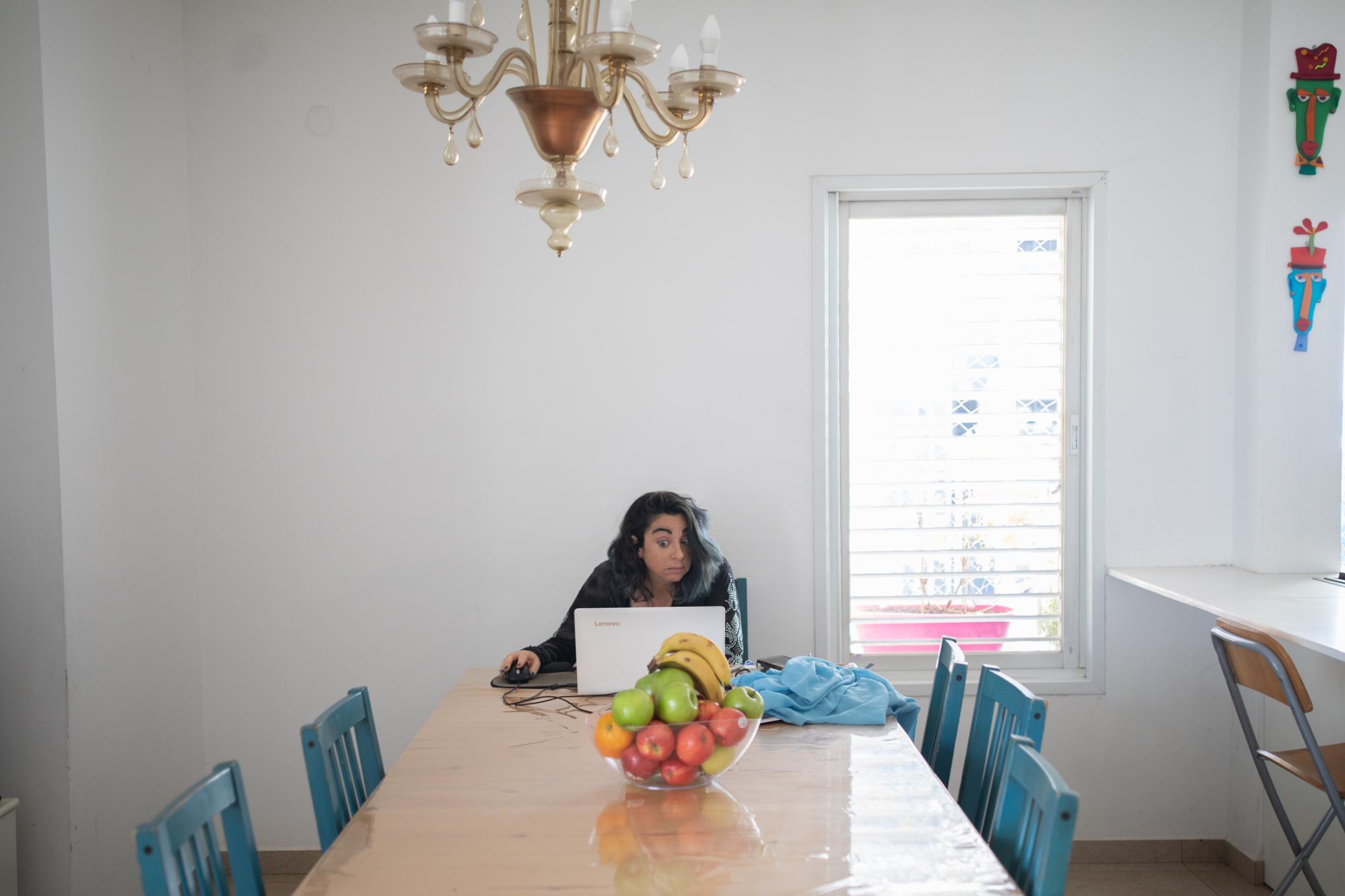
5 / 17
Theatre director Yael Bartenosh, 43, gives an online theatre lesson for children on Zoom in her home in Rehovot, Israel, April 28, 2020.
"I closed my adults’ group, because on Zoom it wasn’t teaching theatre, it was just like teaching acting in front of a camera. And it wasn’t what I wanted. But for the children I felt they need me as much as I need them. So I began to do more things that are fun and short, because online they don’t have the attention."
"I closed my adults’ group, because on Zoom it wasn’t teaching theatre, it was just like teaching acting in front of a camera. And it wasn’t what I wanted. But for the children I felt they need me as much as I need them. So I began to do more things that are fun and short, because online they don’t have the attention."
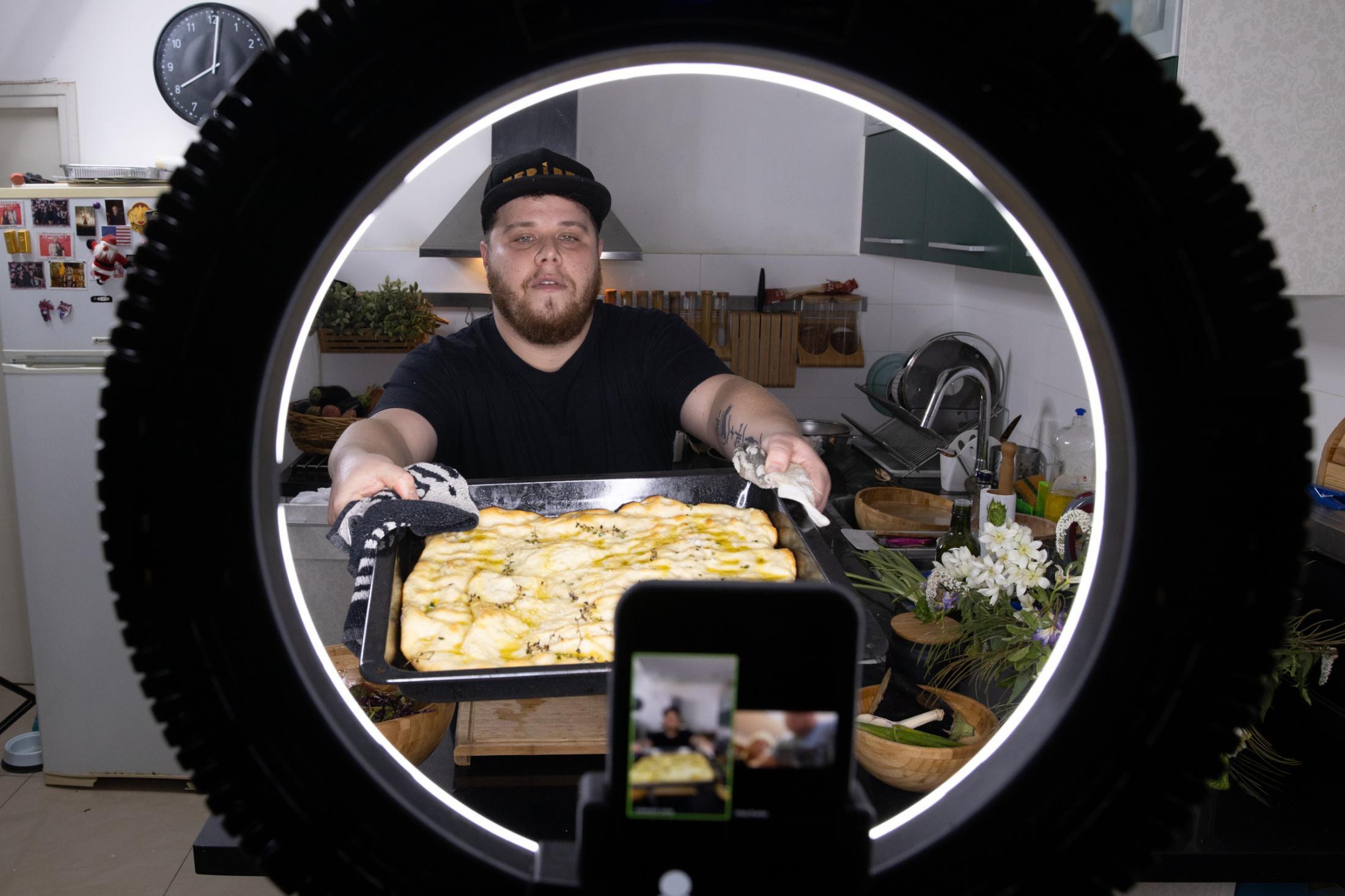
6 / 17
Chef and restaurant owner Shachar Levi, 32, teaches an online cooking class on Zoom in his home in Tel Aviv, Israel, April 23, 2020.
“I asked myself what I can do with this time - like to build a new recipe, do more things on the internet and in the media. I would just try to adjust myself to the situation. And people that know me started reaching out to me for online cooking. I think people tried to find culture in a new way. In my opinion it’s hard to do online classes with food because you need to taste.”
“I asked myself what I can do with this time - like to build a new recipe, do more things on the internet and in the media. I would just try to adjust myself to the situation. And people that know me started reaching out to me for online cooking. I think people tried to find culture in a new way. In my opinion it’s hard to do online classes with food because you need to taste.”
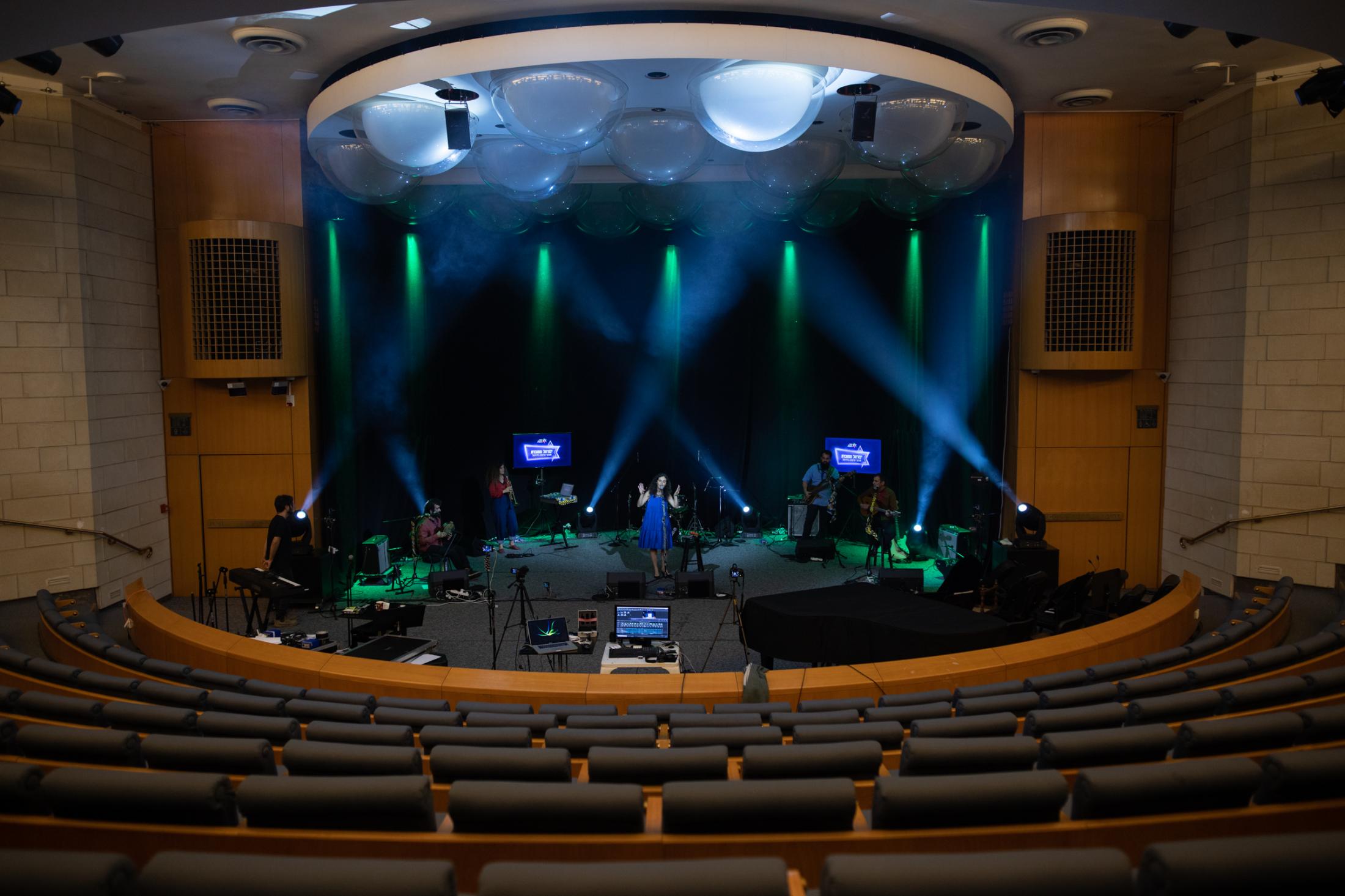
7 / 17
Singer Inbal Djamchid, 33, and fellow band members of ‘Ecoute’ perform at the Enav Cultural Center for a broadcast via Facebook Live, as part of an initiative of the Tel Aviv Municipality to provide free online events for residents during the coronavirus lockdown, Tel Aviv, Israel, May 05, 2020.
"Why pretending that it’s a concert? It’s not – so maybe you need to think of another format. I don’t like doing things that are not real, so why should I pretend there’s audience if there’s not, why should we be on stage when there is nobody."
(Inbal Djamchid, 33, singer)
"Why pretending that it’s a concert? It’s not – so maybe you need to think of another format. I don’t like doing things that are not real, so why should I pretend there’s audience if there’s not, why should we be on stage when there is nobody."
(Inbal Djamchid, 33, singer)
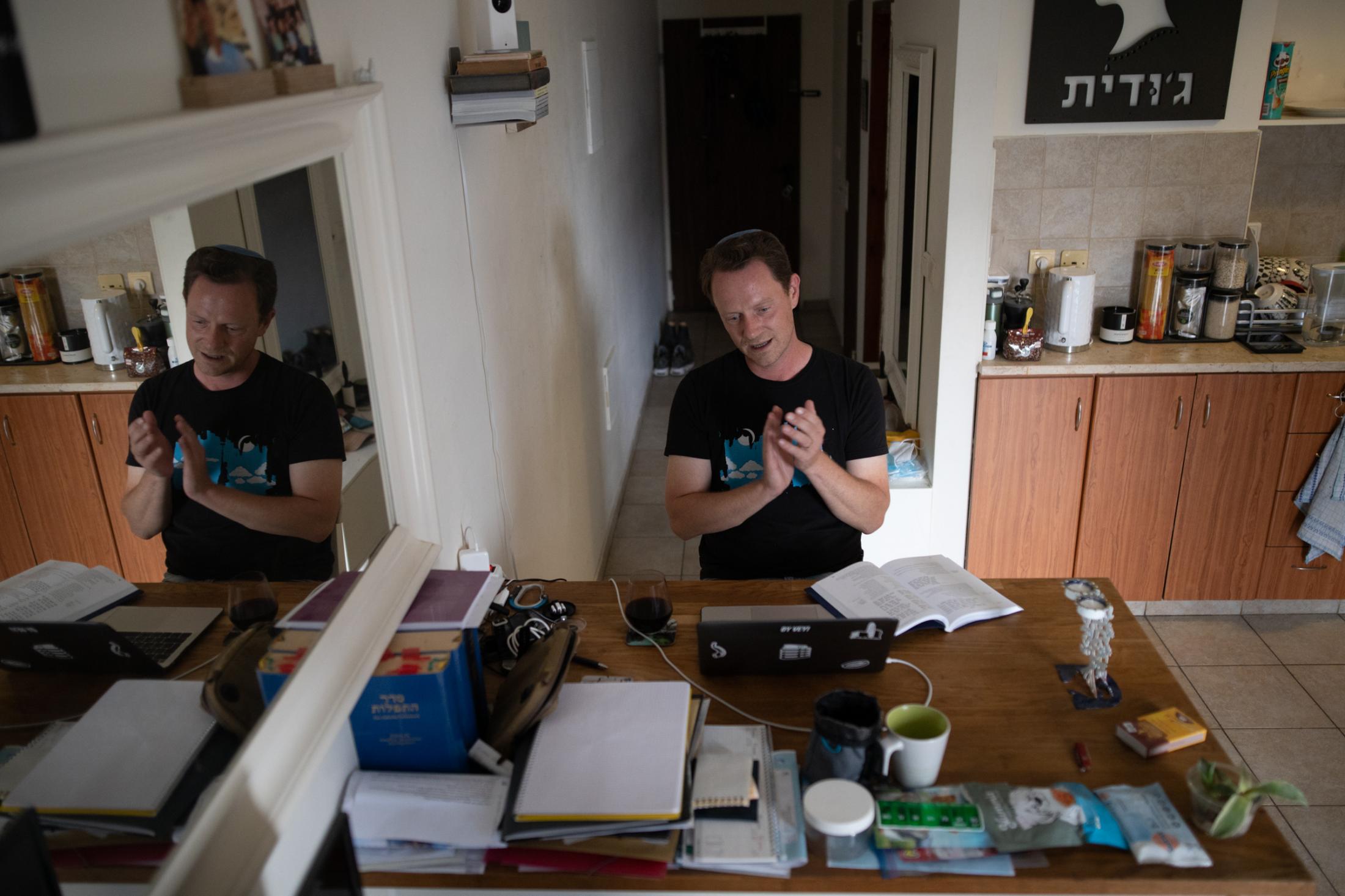
8 / 17
Christian Hickmann, 43, participates in an online synagogue service in his home in Tel Aviv, Israel, April 10, 2020.
“I appreciate that we have the possibility of online communication. Ten or 15 years ago it would not have been possible in this scope and people would have been much more isolated. It helps to preserve the backdrop of normality. For online services, just hearing the familiar melodies helps pretending that everything continues normally. In the end, it is Potemkin villages, but it helps. However, it is not a long-term solution. Judaism lives from physical encounters and community, which is specifically challenging to recreate virtually.”
“I appreciate that we have the possibility of online communication. Ten or 15 years ago it would not have been possible in this scope and people would have been much more isolated. It helps to preserve the backdrop of normality. For online services, just hearing the familiar melodies helps pretending that everything continues normally. In the end, it is Potemkin villages, but it helps. However, it is not a long-term solution. Judaism lives from physical encounters and community, which is specifically challenging to recreate virtually.”
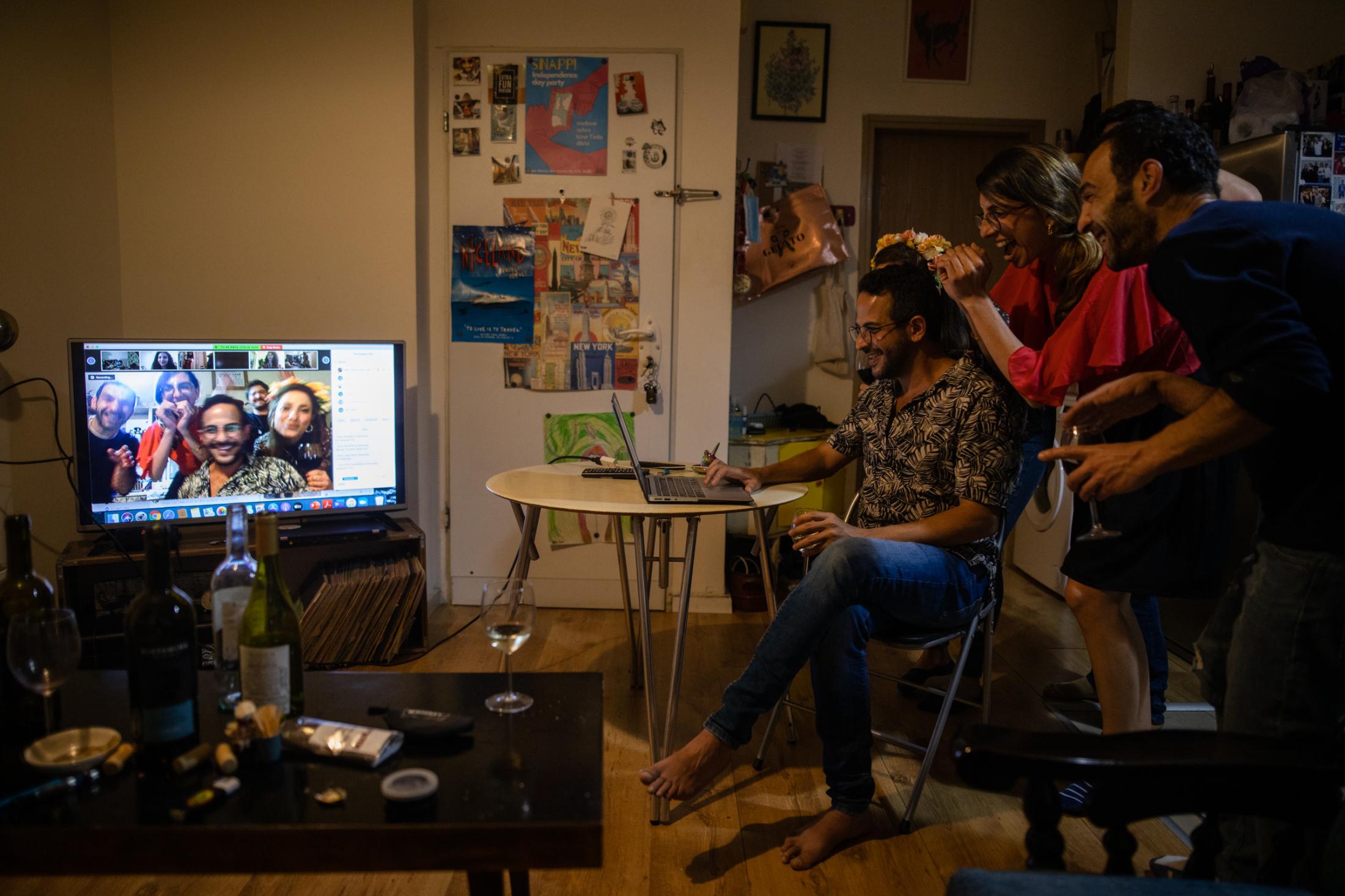
9 / 17
Idan Teram, 35, Mor, 30, and Gabi, 38 (L-R) dance during an online party at home, in Tel Aviv, Israel, April 24, 2020. Since the lockdown due to Coronavirus, Idan co-founded a facebook group as a platform for virtual parties.
“We miss the hugs, we miss seeing new faces, the music sounds way better in real life. But there are a few benefits. It’s pretty convenient, you’re staying in your place, you’re having a bottle of wine, you’re sitting, listening to music and seeing people. And I see people who don’t have access to parties in real life - if you live outside of Tel Aviv or if you have kids - these kind of parties can be an answer for people who enjoy music, who want to party, but who won’t go to a club. So we actually put the party in your place and have everybody participating - and it works.“ (Idan Teram, 35)
“We miss the hugs, we miss seeing new faces, the music sounds way better in real life. But there are a few benefits. It’s pretty convenient, you’re staying in your place, you’re having a bottle of wine, you’re sitting, listening to music and seeing people. And I see people who don’t have access to parties in real life - if you live outside of Tel Aviv or if you have kids - these kind of parties can be an answer for people who enjoy music, who want to party, but who won’t go to a club. So we actually put the party in your place and have everybody participating - and it works.“ (Idan Teram, 35)
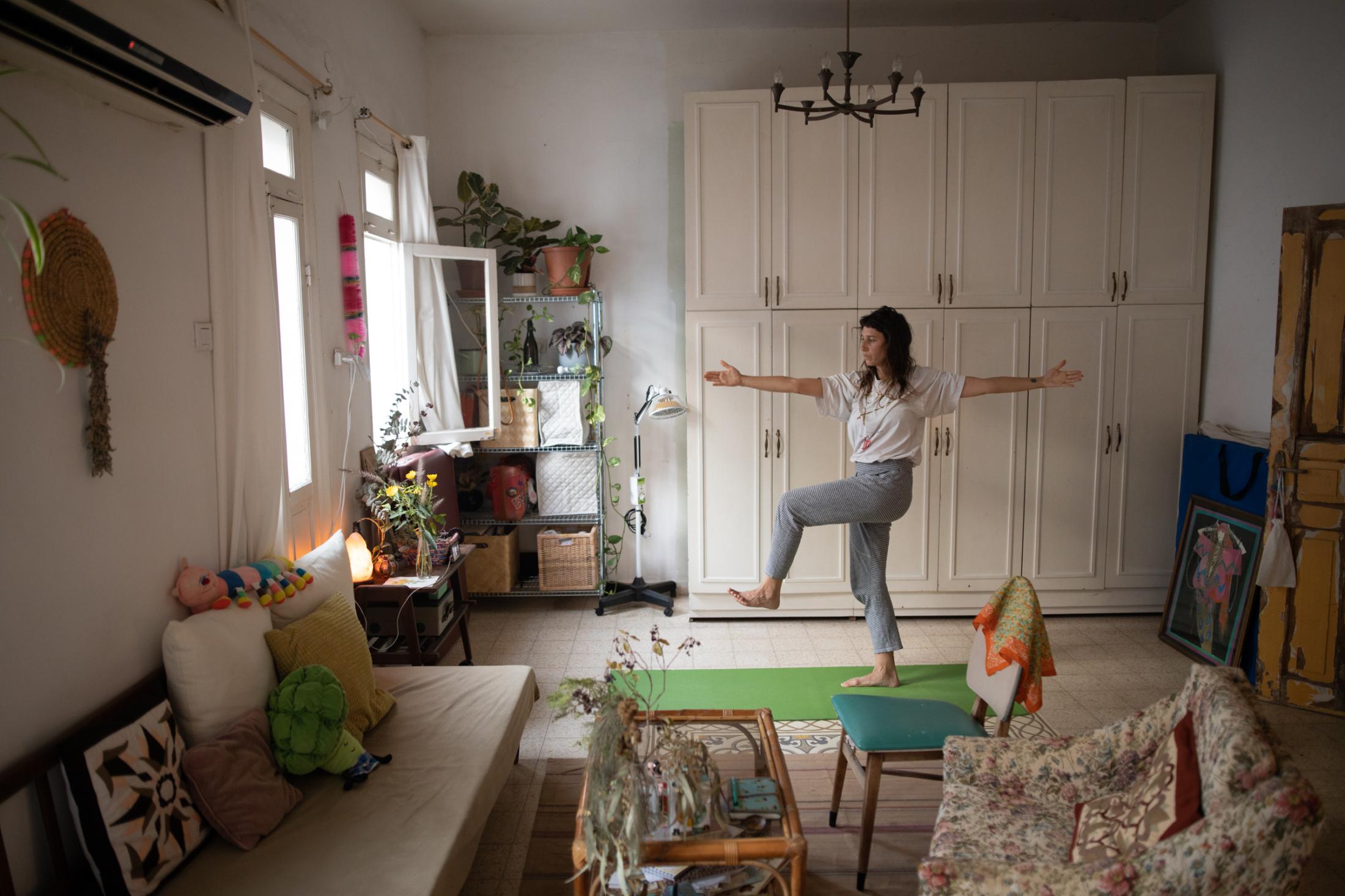
10 / 17
Yuli Yunger, 34, participates in an online yoga class in her home in Tel Aviv, Israel, April 19, 2020.
“The switch to online was not natural for me. I don’t even have a laptop, I have only my cell phone. In the beginning it was weird, and I found it too mechanical. I like the presence of people and of the teacher and that she will move me when I need to be moved. But I got used to it really fast. People are getting used to things, we adjust. And I’m pretty young so I’m adjusting fast. New ideas and new things that you are doing in your life are easy to accept. And it will be easy to leave it as well.”
“The switch to online was not natural for me. I don’t even have a laptop, I have only my cell phone. In the beginning it was weird, and I found it too mechanical. I like the presence of people and of the teacher and that she will move me when I need to be moved. But I got used to it really fast. People are getting used to things, we adjust. And I’m pretty young so I’m adjusting fast. New ideas and new things that you are doing in your life are easy to accept. And it will be easy to leave it as well.”
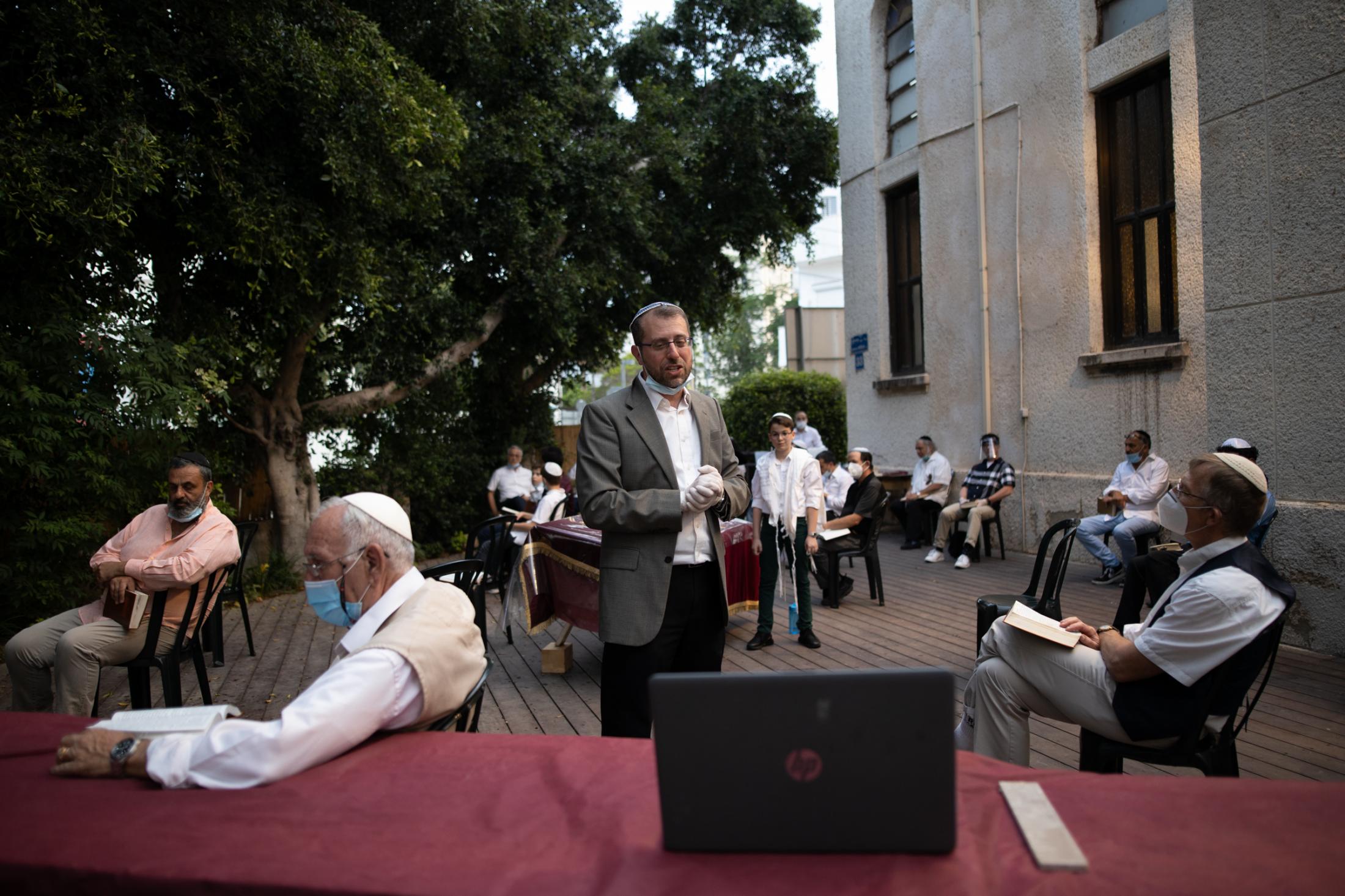
11 / 17
Rabbi Ariel Konstantyn (center) speaks to participants watching a Facebook live broadcast of his Kabbalat Shabbat service in the yard of the Tel Aviv International Synagogue, Israel, May 15, 2020.
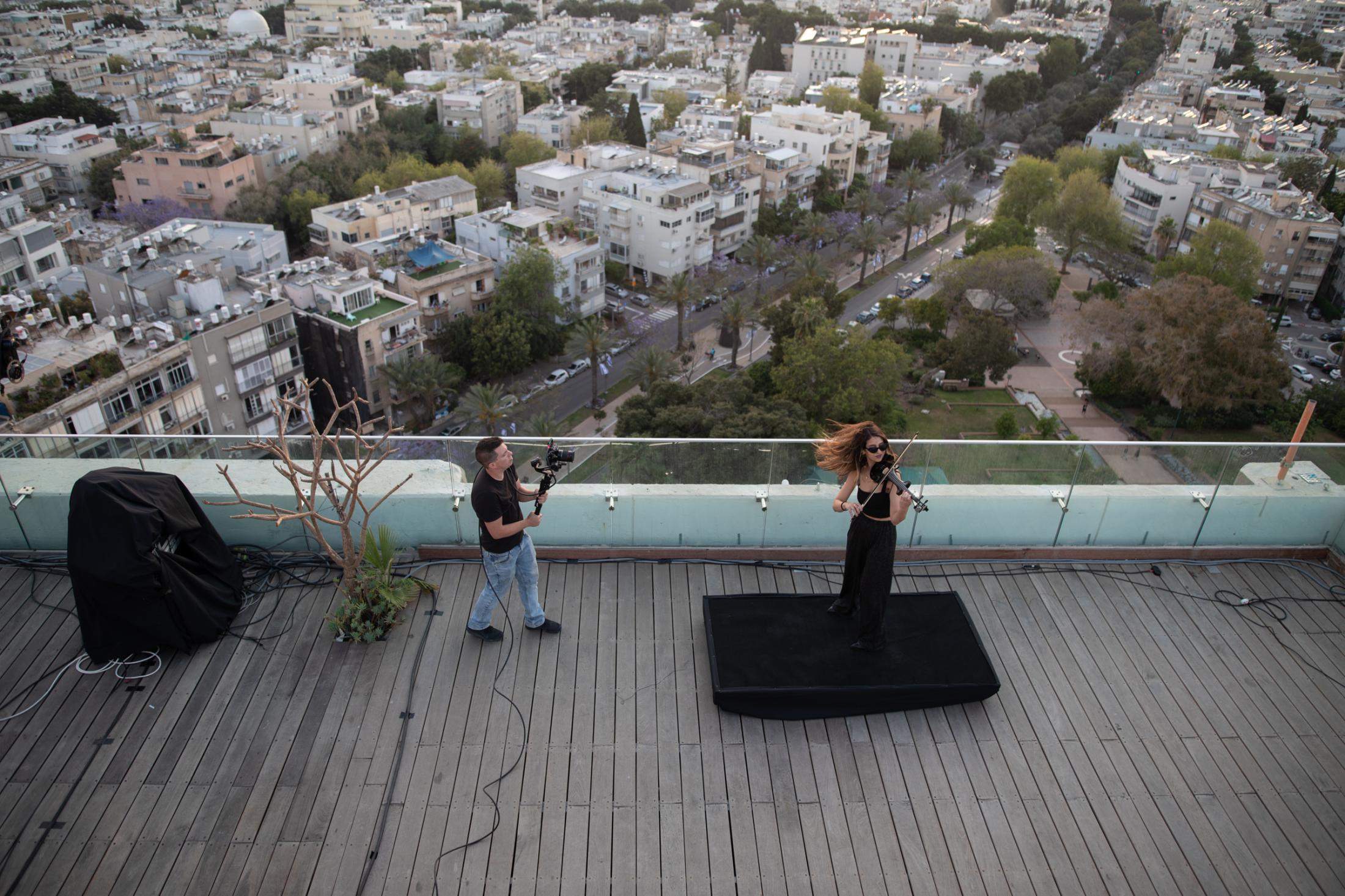
12 / 17
Violinist Eden Enbar, 28, plays violin during an online party that is broadcasted live via Facebook from the roof of the Tel Aviv municipality building, Tel Aviv, Israel, April 29, 2020.
“It’s really weird to perform without a crowd, because we perform for the energy. Now you have to keep up the energy yourself all the time, because you don’t have the crowd to do it for you. But since it’s already happening for two months we got a bit used to it.”
“It’s really weird to perform without a crowd, because we perform for the energy. Now you have to keep up the energy yourself all the time, because you don’t have the crowd to do it for you. But since it’s already happening for two months we got a bit used to it.”
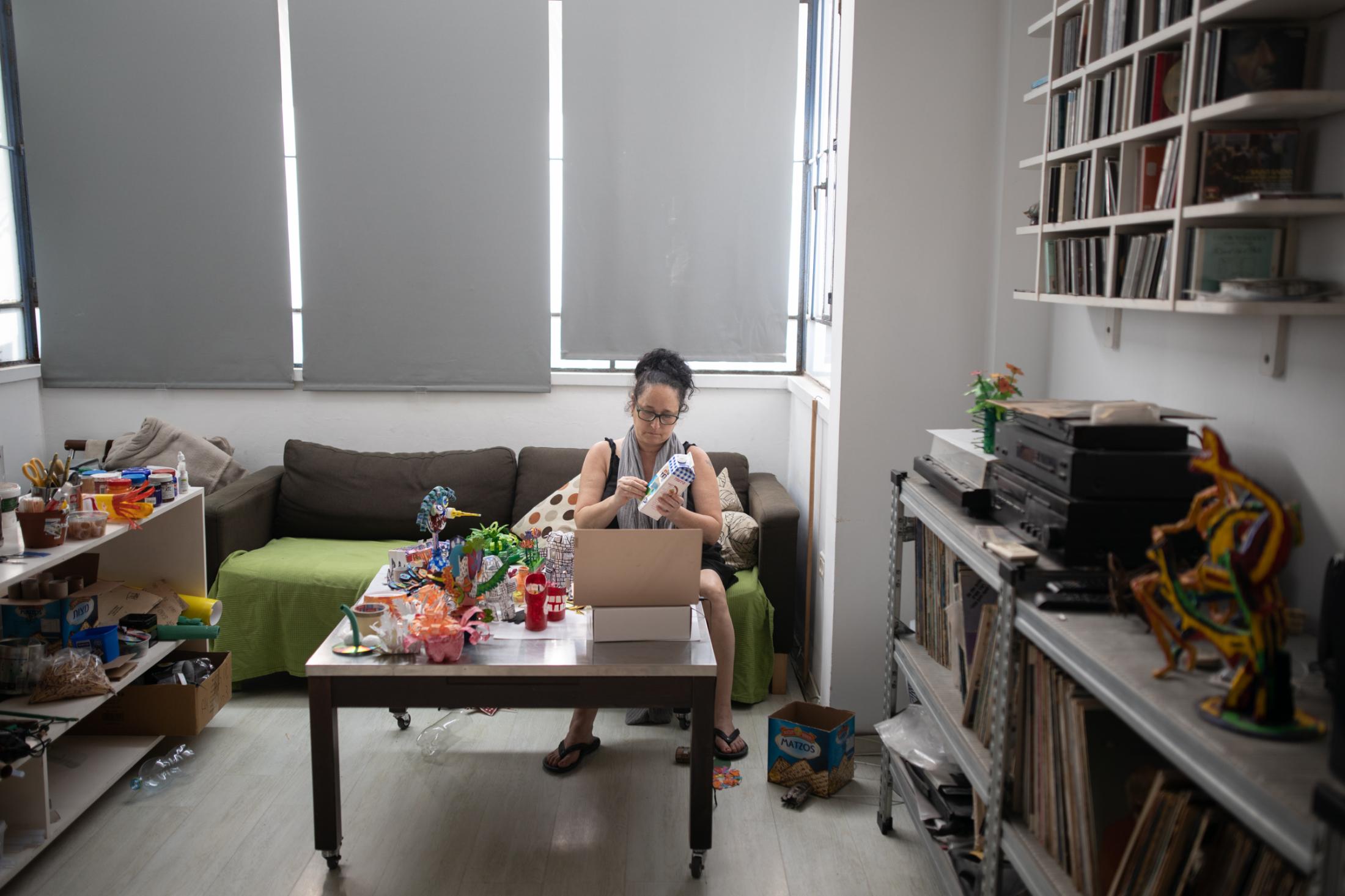
13 / 17
Art teacher Yael Yaari, 53, creates art from recycling materials as part of an online class for children on Zoom in her home in Tel Aviv, Israel, April, 20, 2020.
“I changed my whole perspective. I mostly work in my apartment now, which has basically become my studio. I spend all day here, which means I cook here, I work here, I have my breaks here - There is something about it, my life and my art became intertwined. I like it.”
“I changed my whole perspective. I mostly work in my apartment now, which has basically become my studio. I spend all day here, which means I cook here, I work here, I have my breaks here - There is something about it, my life and my art became intertwined. I like it.”
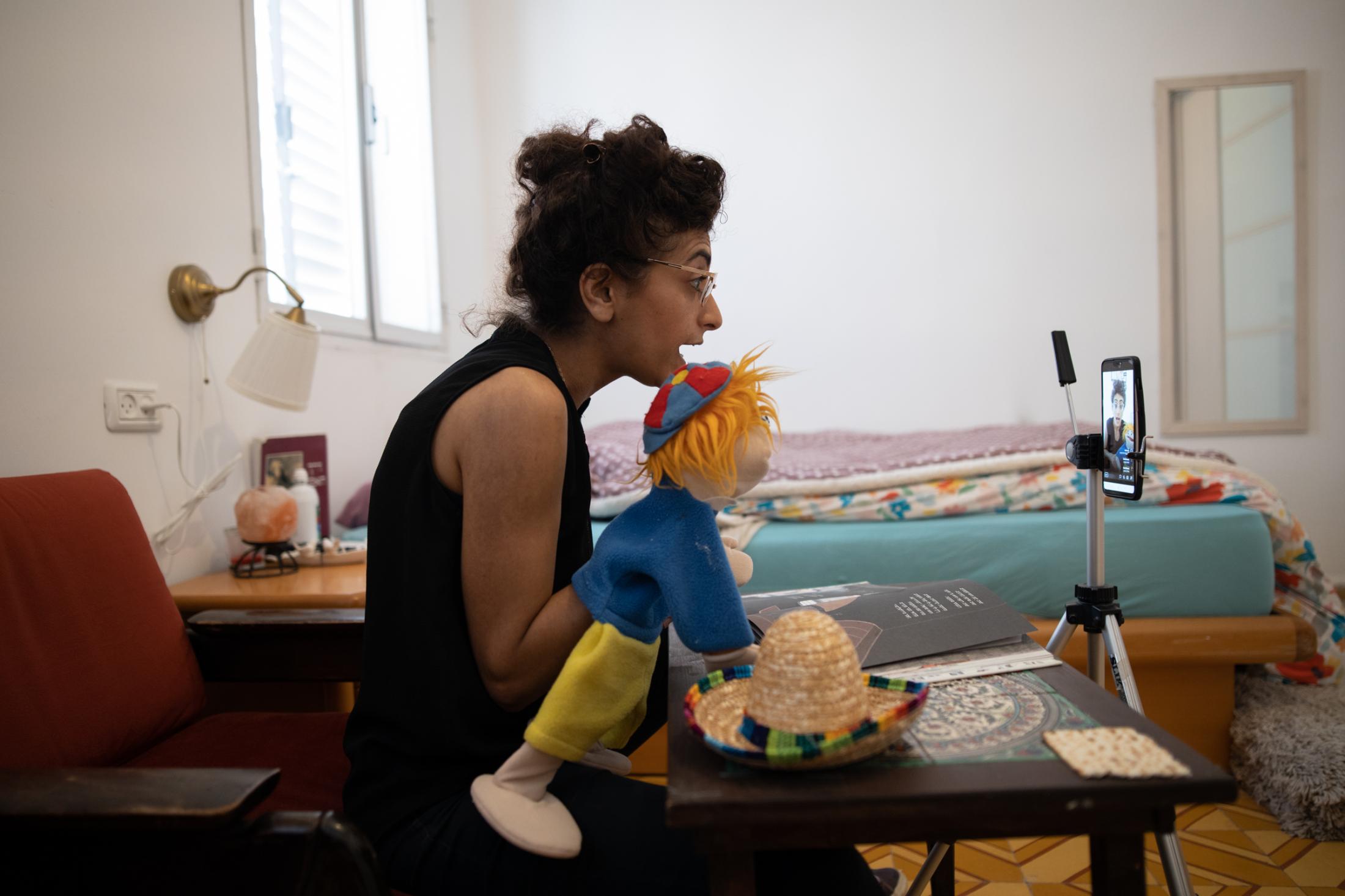
14 / 17
Actress Ruth Tubi, 35, performs with a doll while doing storytelling for children on Zoom in her home in Tel Aviv, Israel, April 30, 2020.
“Usually I feel the energy of the audience, so it’s very different now. This is why online I included the puppet, which makes me feel like somebody else is with me. In storytelling for children, you usually stop in between to ask them how they feel. Now the puppet gives me the answer instead of the children.”
“Usually I feel the energy of the audience, so it’s very different now. This is why online I included the puppet, which makes me feel like somebody else is with me. In storytelling for children, you usually stop in between to ask them how they feel. Now the puppet gives me the answer instead of the children.”
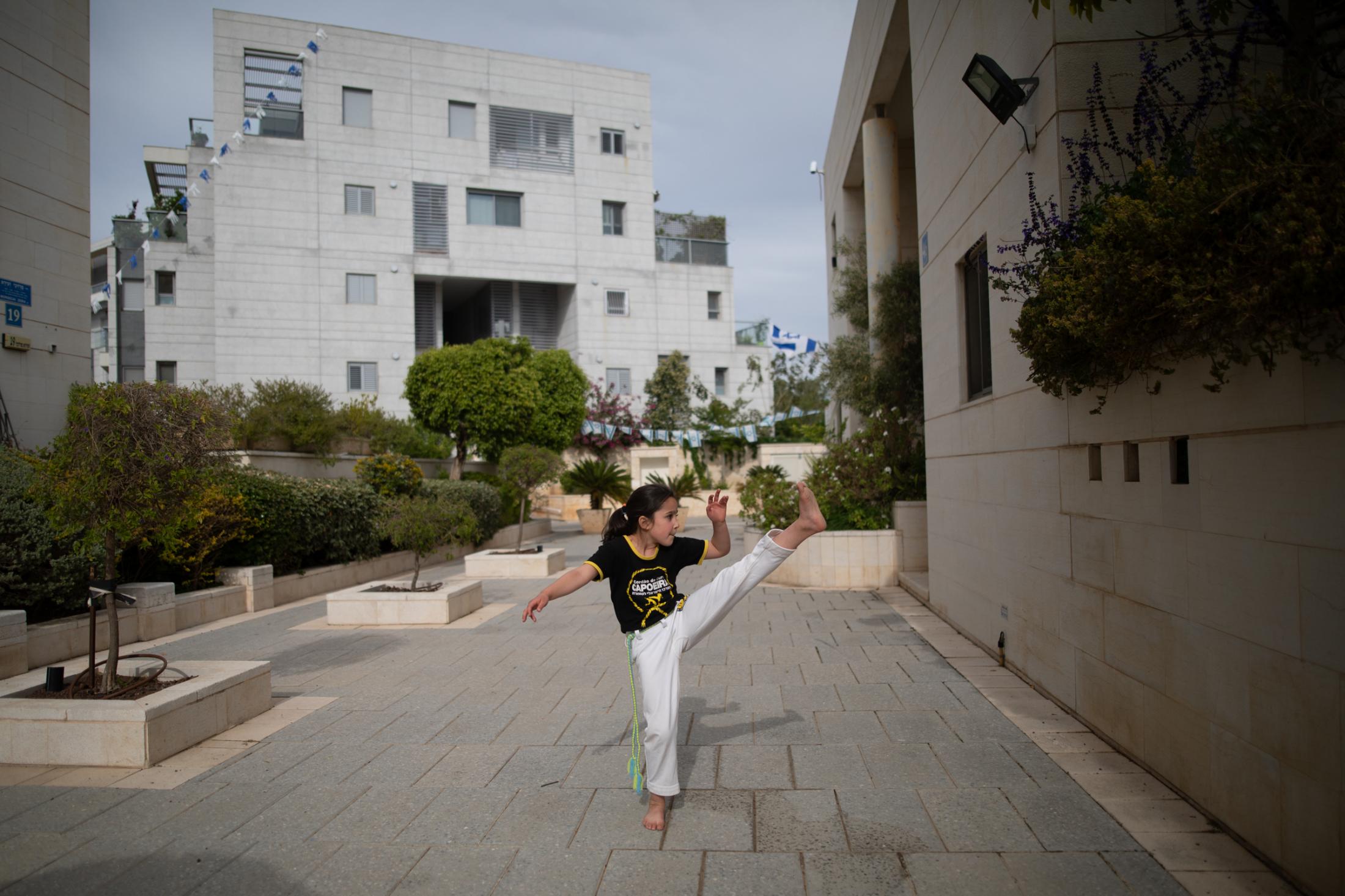
15 / 17
Gaya Jacobs, 7, takes an online Capoeira class via Zoom on her phone, which she adjusted to the wall in front of her home in Tel Aviv, Israel, April 27, 2020.
"It feels weird to me because I am together with all my friends all the time and I see the teacher and I train in the studio, and one day they are telling me ‘You cannot train here anymore, from now on you are training at home’. That wasn’t nice, that wasn’t fun, but I am dealing with it. It’s not so bad."
"It feels weird to me because I am together with all my friends all the time and I see the teacher and I train in the studio, and one day they are telling me ‘You cannot train here anymore, from now on you are training at home’. That wasn’t nice, that wasn’t fun, but I am dealing with it. It’s not so bad."
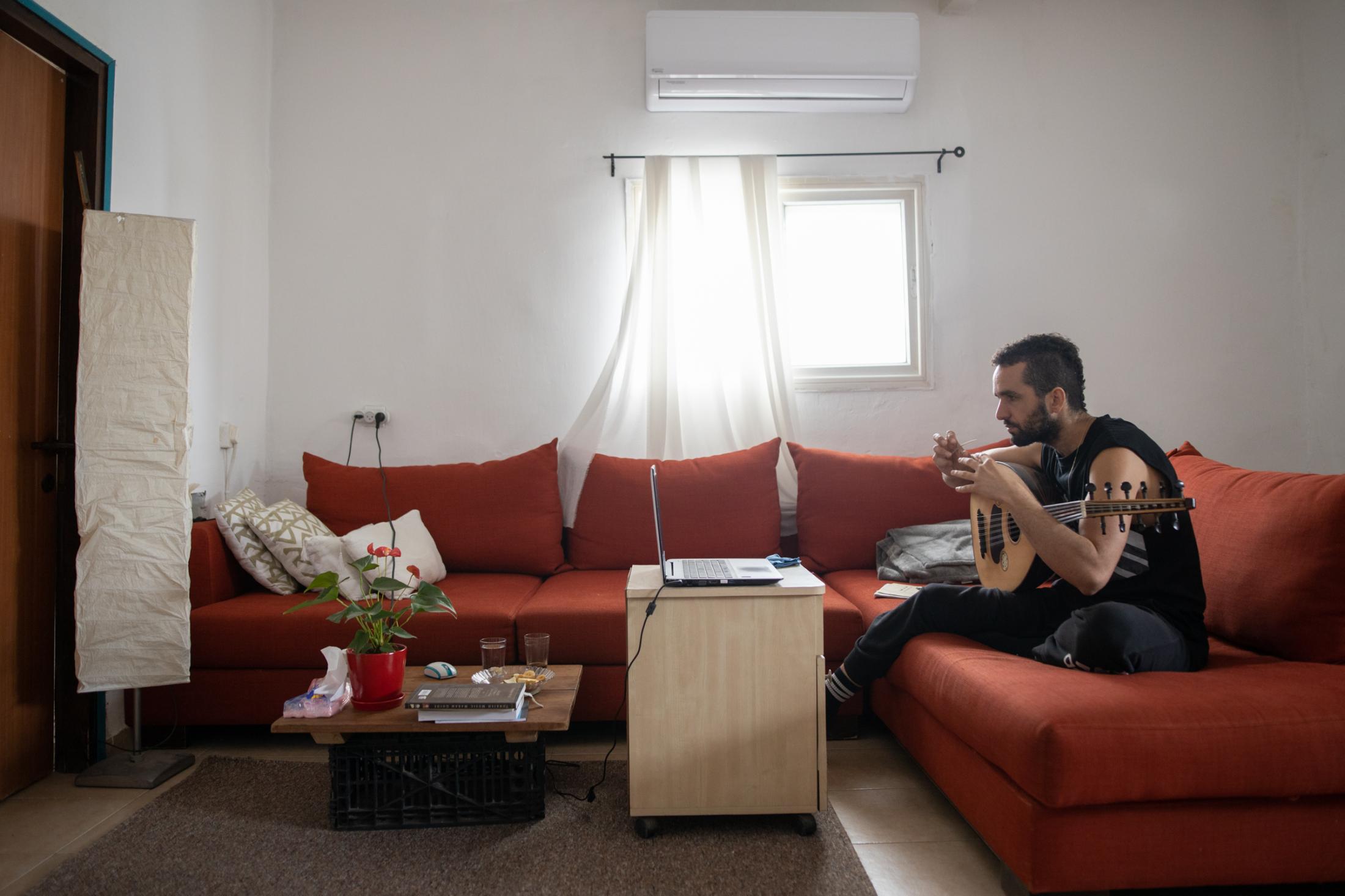
16 / 17
Musician David Cohen, 32, plays on his Oud while giving an online lesson of Arabic music via Zoom in his home in Tel Aviv, Israel, April 24, 2020.
“Teaching music online is very tricky. With ‘Zoom’ there is a delay. So you cannot teach a rhythm, for example. I cannot see how my students’ hands work and I cannot adjust them. Getting used to being apart from people, and then starting to learn how to meet each other again, but in Zoom - it’s not a relationship, it’s not the way to learn or to teach, it’s nothing.”
“Teaching music online is very tricky. With ‘Zoom’ there is a delay. So you cannot teach a rhythm, for example. I cannot see how my students’ hands work and I cannot adjust them. Getting used to being apart from people, and then starting to learn how to meet each other again, but in Zoom - it’s not a relationship, it’s not the way to learn or to teach, it’s nothing.”
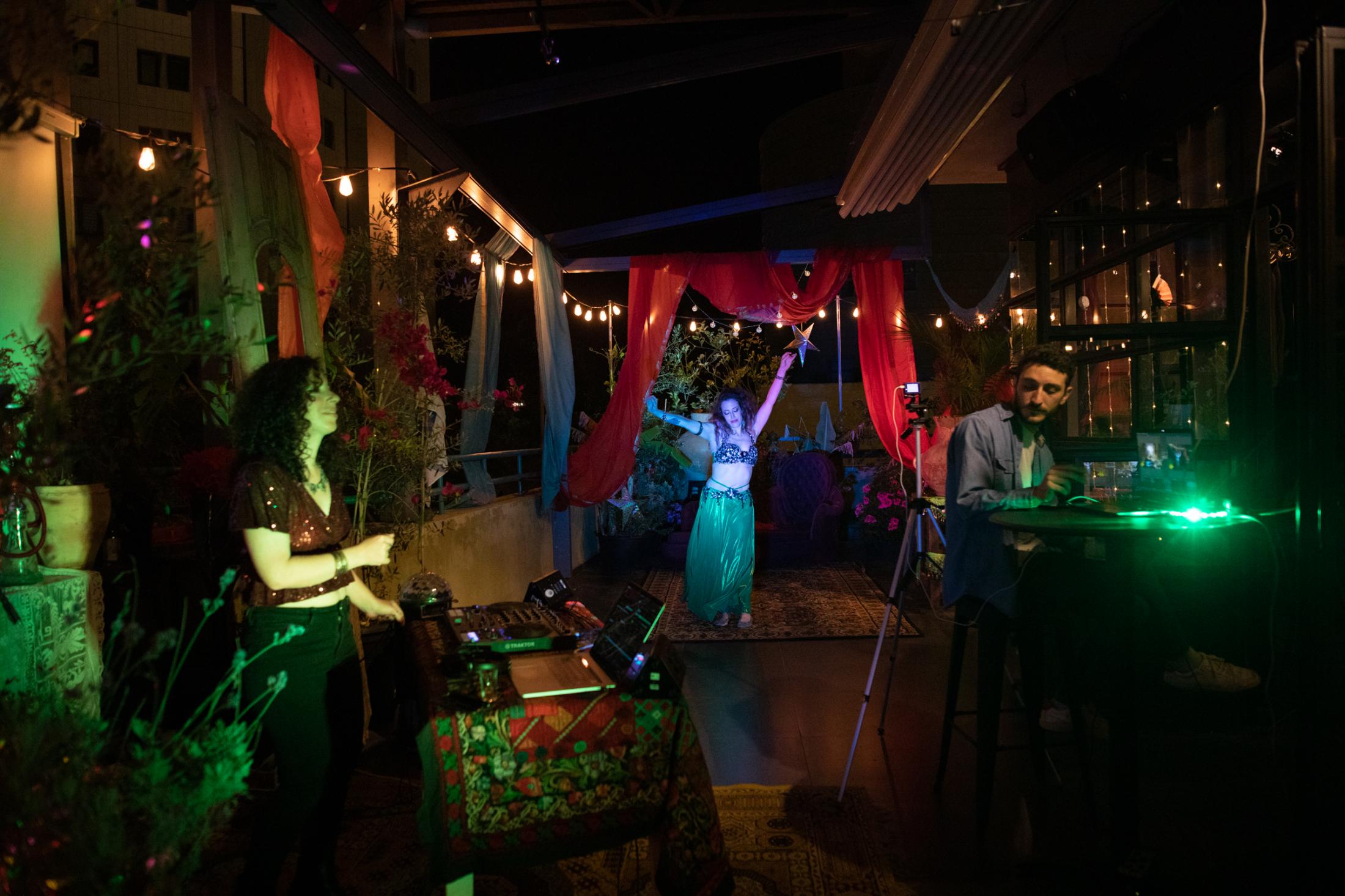
17 / 17
Dancer Ella Greenbaum (center), 41, and DJ Neta Haimovich (left), 35, perform during a Mimouna event, a traditional Moroccan celebration, that is broadcasted live via Facebook from the Inta Lounge Bar in Tel Aviv, as part of an initiative by the Tel Aviv municipality to provide free online events during the coronavirus lockdown, Israel, April 15, 2020.
“It's amazing to see that this communication is working. It can't replace the sensual authentic feeling when you get in a real live show, but it’s better than nothing. “ (Ella Greenbaum, 41, dancer)
“It’s hard as a DJ not to get responses from the crowd. When I’m preparing for a party, I never know what I’m going to play. I’m just looking at the crowd and the way people react to different kinds of music and that is how I know what to play. But in the medium that we picked (Facebook live) I couldn’t feel the crowd, so you have to be your own party.” (Neta Haimovich, 35, DJ)
“It's amazing to see that this communication is working. It can't replace the sensual authentic feeling when you get in a real live show, but it’s better than nothing. “ (Ella Greenbaum, 41, dancer)
“It’s hard as a DJ not to get responses from the crowd. When I’m preparing for a party, I never know what I’m going to play. I’m just looking at the crowd and the way people react to different kinds of music and that is how I know what to play. But in the medium that we picked (Facebook live) I couldn’t feel the crowd, so you have to be your own party.” (Neta Haimovich, 35, DJ)
ONLINE - LIFE DURING THE PANDEMIC
In times of social distancing life has shifted from the physical world to online platforms. Video calls and social networks have become essential tools to preserve human connections, yet profoundly changed communication. Activities for which real-life encounters were considered indispensable, have found their way to the virtual realm in an attempt to keep alive routines and social occasions. Living rooms turn into sports halls, religion is practiced via computer and parties without crowds find partakers from home. Can a format that emerged as a coping mechanism for lockdowns during Coronavirus endure in a post-social distancing era? In what way can it replace real-life experiences? How does it reshape relationships, work environments and social norms?
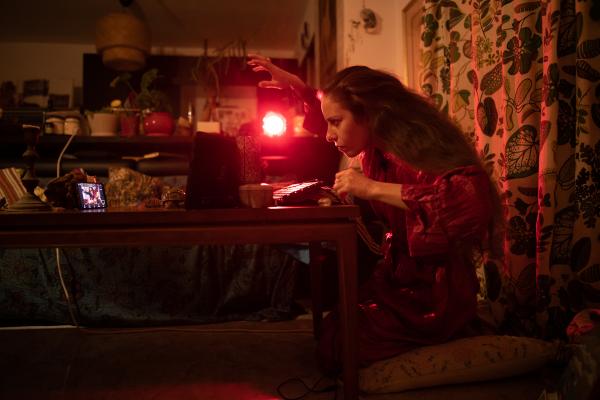















ONLINE - LIFE DURING THE PANDEMIC
In times of social distancing life has shifted from the physical world to online platforms. Video calls and social networks have become essential tools to preserve human connections, yet profoundly changed communication. Activities for which real-life encounters were considered indispensable, have found their way to the virtual realm in an attempt to keep alive routines and social occasions. Living rooms turn into sports halls, religion is practiced via computer and parties without crowds find partakers from home. Can a format that emerged as a coping mechanism for lockdowns during Coronavirus endure in a post-social distancing era? In what way can it replace real-life experiences? How does it reshape relationships, work environments and social norms?

Actress of Mystorin Theatere, Dana Forer, 41, performs in front of her phone during a live show on Zoom in her home in Tel Aviv, Israel, April 12, 2020.
“One of the things that made me be in this profession is the eye contact and the direct feedback I get from the audience. Now I’m doing the action but without reaction. The audience watches me, but I don’t see them. I act towards my partners, but I’m just looking at myself. On the one hand it feels lonely, but on the other hand it feels very intimate and exposed. I would never have thought that I would get into a situation that I let almost 100 people ‘into my house’.”
“One of the things that made me be in this profession is the eye contact and the direct feedback I get from the audience. Now I’m doing the action but without reaction. The audience watches me, but I don’t see them. I act towards my partners, but I’m just looking at myself. On the one hand it feels lonely, but on the other hand it feels very intimate and exposed. I would never have thought that I would get into a situation that I let almost 100 people ‘into my house’.”

DJ Itay Galo, 33, performs during an online party that is broadcasted live via Zoom and Facebook Live, from the roof of the Tel Aviv municipality building, Tel Aviv, Israel, April 29, 2020.
“It’s like a fake, it’s not the real thing, but everybody tags me on Facebook and Instagram, they watch me and I like it. It’s good for this situation, but after the Corona I want to see the crowd.”
“It’s like a fake, it’s not the real thing, but everybody tags me on Facebook and Instagram, they watch me and I like it. It’s good for this situation, but after the Corona I want to see the crowd.”

Capoeira instructor Gal Maabari, 25, gives an online Capoeira lesson for children on Zoom in his home in Tel Aviv, Israel, April 16, 2020.
“For me it’s a positive experience. Giving an online course makes me think about the ‘Why’, about the purpose of why I’m doing it. It’s like resetting the whole concept of work, of everything. It makes me creative because now I need to think about the interaction with the students. Everything I do in the physical class, like giving feedback or demonstrating something, I do automatically; everything I do in the online classes, I understand better now.”
“For me it’s a positive experience. Giving an online course makes me think about the ‘Why’, about the purpose of why I’m doing it. It’s like resetting the whole concept of work, of everything. It makes me creative because now I need to think about the interaction with the students. Everything I do in the physical class, like giving feedback or demonstrating something, I do automatically; everything I do in the online classes, I understand better now.”

Theatre director Yael Bartenosh, 43, gives an online theatre lesson for children on Zoom in her home in Rehovot, Israel, April 28, 2020.
"I closed my adults’ group, because on Zoom it wasn’t teaching theatre, it was just like teaching acting in front of a camera. And it wasn’t what I wanted. But for the children I felt they need me as much as I need them. So I began to do more things that are fun and short, because online they don’t have the attention."
"I closed my adults’ group, because on Zoom it wasn’t teaching theatre, it was just like teaching acting in front of a camera. And it wasn’t what I wanted. But for the children I felt they need me as much as I need them. So I began to do more things that are fun and short, because online they don’t have the attention."

Chef and restaurant owner Shachar Levi, 32, teaches an online cooking class on Zoom in his home in Tel Aviv, Israel, April 23, 2020.
“I asked myself what I can do with this time - like to build a new recipe, do more things on the internet and in the media. I would just try to adjust myself to the situation. And people that know me started reaching out to me for online cooking. I think people tried to find culture in a new way. In my opinion it’s hard to do online classes with food because you need to taste.”
“I asked myself what I can do with this time - like to build a new recipe, do more things on the internet and in the media. I would just try to adjust myself to the situation. And people that know me started reaching out to me for online cooking. I think people tried to find culture in a new way. In my opinion it’s hard to do online classes with food because you need to taste.”

Singer Inbal Djamchid, 33, and fellow band members of ‘Ecoute’ perform at the Enav Cultural Center for a broadcast via Facebook Live, as part of an initiative of the Tel Aviv Municipality to provide free online events for residents during the coronavirus lockdown, Tel Aviv, Israel, May 05, 2020.
"Why pretending that it’s a concert? It’s not – so maybe you need to think of another format. I don’t like doing things that are not real, so why should I pretend there’s audience if there’s not, why should we be on stage when there is nobody."
(Inbal Djamchid, 33, singer)
"Why pretending that it’s a concert? It’s not – so maybe you need to think of another format. I don’t like doing things that are not real, so why should I pretend there’s audience if there’s not, why should we be on stage when there is nobody."
(Inbal Djamchid, 33, singer)

Christian Hickmann, 43, participates in an online synagogue service in his home in Tel Aviv, Israel, April 10, 2020.
“I appreciate that we have the possibility of online communication. Ten or 15 years ago it would not have been possible in this scope and people would have been much more isolated. It helps to preserve the backdrop of normality. For online services, just hearing the familiar melodies helps pretending that everything continues normally. In the end, it is Potemkin villages, but it helps. However, it is not a long-term solution. Judaism lives from physical encounters and community, which is specifically challenging to recreate virtually.”
“I appreciate that we have the possibility of online communication. Ten or 15 years ago it would not have been possible in this scope and people would have been much more isolated. It helps to preserve the backdrop of normality. For online services, just hearing the familiar melodies helps pretending that everything continues normally. In the end, it is Potemkin villages, but it helps. However, it is not a long-term solution. Judaism lives from physical encounters and community, which is specifically challenging to recreate virtually.”

Idan Teram, 35, Mor, 30, and Gabi, 38 (L-R) dance during an online party at home, in Tel Aviv, Israel, April 24, 2020. Since the lockdown due to Coronavirus, Idan co-founded a facebook group as a platform for virtual parties.
“We miss the hugs, we miss seeing new faces, the music sounds way better in real life. But there are a few benefits. It’s pretty convenient, you’re staying in your place, you’re having a bottle of wine, you’re sitting, listening to music and seeing people. And I see people who don’t have access to parties in real life - if you live outside of Tel Aviv or if you have kids - these kind of parties can be an answer for people who enjoy music, who want to party, but who won’t go to a club. So we actually put the party in your place and have everybody participating - and it works.“ (Idan Teram, 35)
“We miss the hugs, we miss seeing new faces, the music sounds way better in real life. But there are a few benefits. It’s pretty convenient, you’re staying in your place, you’re having a bottle of wine, you’re sitting, listening to music and seeing people. And I see people who don’t have access to parties in real life - if you live outside of Tel Aviv or if you have kids - these kind of parties can be an answer for people who enjoy music, who want to party, but who won’t go to a club. So we actually put the party in your place and have everybody participating - and it works.“ (Idan Teram, 35)

Yuli Yunger, 34, participates in an online yoga class in her home in Tel Aviv, Israel, April 19, 2020.
“The switch to online was not natural for me. I don’t even have a laptop, I have only my cell phone. In the beginning it was weird, and I found it too mechanical. I like the presence of people and of the teacher and that she will move me when I need to be moved. But I got used to it really fast. People are getting used to things, we adjust. And I’m pretty young so I’m adjusting fast. New ideas and new things that you are doing in your life are easy to accept. And it will be easy to leave it as well.”
“The switch to online was not natural for me. I don’t even have a laptop, I have only my cell phone. In the beginning it was weird, and I found it too mechanical. I like the presence of people and of the teacher and that she will move me when I need to be moved. But I got used to it really fast. People are getting used to things, we adjust. And I’m pretty young so I’m adjusting fast. New ideas and new things that you are doing in your life are easy to accept. And it will be easy to leave it as well.”

Rabbi Ariel Konstantyn (center) speaks to participants watching a Facebook live broadcast of his Kabbalat Shabbat service in the yard of the Tel Aviv International Synagogue, Israel, May 15, 2020.

Violinist Eden Enbar, 28, plays violin during an online party that is broadcasted live via Facebook from the roof of the Tel Aviv municipality building, Tel Aviv, Israel, April 29, 2020.
“It’s really weird to perform without a crowd, because we perform for the energy. Now you have to keep up the energy yourself all the time, because you don’t have the crowd to do it for you. But since it’s already happening for two months we got a bit used to it.”
“It’s really weird to perform without a crowd, because we perform for the energy. Now you have to keep up the energy yourself all the time, because you don’t have the crowd to do it for you. But since it’s already happening for two months we got a bit used to it.”

Art teacher Yael Yaari, 53, creates art from recycling materials as part of an online class for children on Zoom in her home in Tel Aviv, Israel, April, 20, 2020.
“I changed my whole perspective. I mostly work in my apartment now, which has basically become my studio. I spend all day here, which means I cook here, I work here, I have my breaks here - There is something about it, my life and my art became intertwined. I like it.”
“I changed my whole perspective. I mostly work in my apartment now, which has basically become my studio. I spend all day here, which means I cook here, I work here, I have my breaks here - There is something about it, my life and my art became intertwined. I like it.”

Actress Ruth Tubi, 35, performs with a doll while doing storytelling for children on Zoom in her home in Tel Aviv, Israel, April 30, 2020.
“Usually I feel the energy of the audience, so it’s very different now. This is why online I included the puppet, which makes me feel like somebody else is with me. In storytelling for children, you usually stop in between to ask them how they feel. Now the puppet gives me the answer instead of the children.”
“Usually I feel the energy of the audience, so it’s very different now. This is why online I included the puppet, which makes me feel like somebody else is with me. In storytelling for children, you usually stop in between to ask them how they feel. Now the puppet gives me the answer instead of the children.”

Gaya Jacobs, 7, takes an online Capoeira class via Zoom on her phone, which she adjusted to the wall in front of her home in Tel Aviv, Israel, April 27, 2020.
"It feels weird to me because I am together with all my friends all the time and I see the teacher and I train in the studio, and one day they are telling me ‘You cannot train here anymore, from now on you are training at home’. That wasn’t nice, that wasn’t fun, but I am dealing with it. It’s not so bad."
"It feels weird to me because I am together with all my friends all the time and I see the teacher and I train in the studio, and one day they are telling me ‘You cannot train here anymore, from now on you are training at home’. That wasn’t nice, that wasn’t fun, but I am dealing with it. It’s not so bad."

Musician David Cohen, 32, plays on his Oud while giving an online lesson of Arabic music via Zoom in his home in Tel Aviv, Israel, April 24, 2020.
“Teaching music online is very tricky. With ‘Zoom’ there is a delay. So you cannot teach a rhythm, for example. I cannot see how my students’ hands work and I cannot adjust them. Getting used to being apart from people, and then starting to learn how to meet each other again, but in Zoom - it’s not a relationship, it’s not the way to learn or to teach, it’s nothing.”
“Teaching music online is very tricky. With ‘Zoom’ there is a delay. So you cannot teach a rhythm, for example. I cannot see how my students’ hands work and I cannot adjust them. Getting used to being apart from people, and then starting to learn how to meet each other again, but in Zoom - it’s not a relationship, it’s not the way to learn or to teach, it’s nothing.”

Dancer Ella Greenbaum (center), 41, and DJ Neta Haimovich (left), 35, perform during a Mimouna event, a traditional Moroccan celebration, that is broadcasted live via Facebook from the Inta Lounge Bar in Tel Aviv, as part of an initiative by the Tel Aviv municipality to provide free online events during the coronavirus lockdown, Israel, April 15, 2020.
“It's amazing to see that this communication is working. It can't replace the sensual authentic feeling when you get in a real live show, but it’s better than nothing. “ (Ella Greenbaum, 41, dancer)
“It’s hard as a DJ not to get responses from the crowd. When I’m preparing for a party, I never know what I’m going to play. I’m just looking at the crowd and the way people react to different kinds of music and that is how I know what to play. But in the medium that we picked (Facebook live) I couldn’t feel the crowd, so you have to be your own party.” (Neta Haimovich, 35, DJ)
“It's amazing to see that this communication is working. It can't replace the sensual authentic feeling when you get in a real live show, but it’s better than nothing. “ (Ella Greenbaum, 41, dancer)
“It’s hard as a DJ not to get responses from the crowd. When I’m preparing for a party, I never know what I’m going to play. I’m just looking at the crowd and the way people react to different kinds of music and that is how I know what to play. But in the medium that we picked (Facebook live) I couldn’t feel the crowd, so you have to be your own party.” (Neta Haimovich, 35, DJ)
